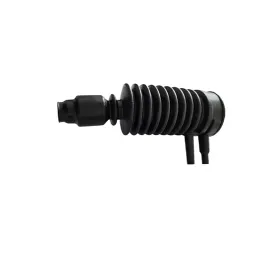Metal Sealing Washers
Design Considerations
The design of metal sealing washers is a precise science that involves several key factors:
- Material Selection: The choice of material depends on the application's requirements. Common materials include stainless steel, copper, aluminum, brass, and nickel alloys. Each material offers unique properties such as corrosion resistance, high-temperature tolerance, and mechanical strength.
- Dimensions and Geometry: The dimensions of the washer are critical for proper fit and function. Engineers must consider factors like inner diameter, outer diameter, thickness, and surface finish. Custom designs can accommodate special geometries, including oval or irregular shapes, to meet specific needs.
- Environmental Conditions: Sealing washers must withstand various environmental conditions, such as extreme temperatures, pressure, and exposure to chemicals. Design considerations include temperature range, chemical compatibility, and mechanical stress.
2.
Manufacturing Process
The manufacturing process of metal sealing washers involves several stages to ensure high-quality and reliable performance:
- Raw Material Preparation: High-quality raw materials are selected based on the desired properties. For instance, stainless steel is often chosen for its durability and resistance to corrosion.
- Precision Cutting and Shaping: Advanced machinery, such as laser cutting, CNC machining, and stamping, is used to cut and shape the metal into the required dimensions. This ensures precision and consistency across all units.
- Surface Treatment: Surface treatments like anodizing, plating, and coating enhance the washer's durability and performance. These treatments provide additional layers of protection against wear, corrosion, and chemical exposure.
- Quality Control: Rigorous quality control measures are implemented at every stage of production. Inspections include dimensional checks, material testing, and functional tests to ensure each washer meets the required specifications.
3.
Sealing Protection
Metal sealing washers offer superior sealing protection in various applications:
- Pressure Containment:In high-pressure environments, such as hydraulic systems and pipelines, sealing washers prevent fluid or gas leaks. Their robust design ensures a tight seal even under extreme pressure.
- Temperature Resistance:Many metal washers can withstand high temperatures without degrading. This makes them ideal for use in engines, furnaces, and other high-heat applications.
- Chemical Resistance: Certain metals, like stainless steel and nickel alloys, exhibit excellent resistance to corrosive chemicals. This property is crucial in industries like petrochemicals and pharmaceuticals.
- Mechanical Strength: Metal washers provide structural support and distribute load evenly across fastened joints. This prevents damage to connected components and extends the lifespan of the entire system.
4.
Applications
Metal sealing washers find extensive use across multiple industries due to their versatility and reliability:
- Automotive Industry: In automotive applications, sealing washers are used in engines, transmissions, and suspension systems. They help reduce noise, absorb vibrations, and prevent leaks from oil and fuel systems.
- Aerospace Industry: Aerospace engineers rely on metal sealing washers for critical components like fuel lines, hydraulic systems, and environmental control systems. Their lightweight yet durable nature makes them ideal for aerospace applications.
- Oil and Gas Industry: In the oil and gas sector, sealing washers are vital for sealing off drilling equipment, pipelines, and offshore platforms. They protect against harsh marine environments and ensure safe operation in extreme conditions.
- Manufacturing and Construction:Industries like manufacturing and construction use sealing washers in machinery, pumps, and valves. These components prevent leaks and ensure efficient operation, contributing to higher productivity and safety standards.
- Medical Devices: In medical devices, sealing washers are used in sterilization equipment, surgical instruments, and diagnostic machines. Their biocompatibility and ability to withstand sterilization processes make them indispensable in healthcare settings.
5.
Advantages and Benefits
The advantages of using metal sealing washers are numerous:
- Enhanced Sealing Performance: The precise design and material selection ensure a tight seal, reducing the risk of leaks and improving overall system efficiency.
- Durability and Longevity: High-quality materials and advanced manufacturing techniques result in components that can withstand extreme conditions, offering extended service life.
- Cost-Effective Solutions:Customizable options and efficient production processes lead to cost-effective sealing solutions tailored to specific needs.
- Environmental Compatibility:Many metals used in sealing washers are environmentally friendly and comply with stringent regulations regarding emissions and waste disposal.
In conclusion, metal sealing washers represent a significant advancement in sealing technology. Their ability to be customized, combined with robust manufacturing methods and versatile applications, makes them indispensable in modern industrial operations. Whether for automotive, aerospace, or other demanding sectors, these components deliver reliable performance and contribute to safer, more efficient systems.This comprehensive overview provides detailed insights into the design, materials, manufacturing, and applications of metal sealing washers, highlighting their importance and versatility in various industries.






































